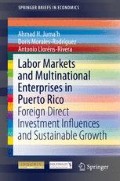Abstract
The globalization increased the fragmentation of production as a result of economies of scale and challenged countries to seek competitiveness with respect to the attraction and retention of multinational companies. As discussed in the first chapter, industrial incentives policies to attract FDI in the manufacturing sector have been essential element in the strategy for the economic development of Puerto Rico from the decade of 1940–1950. The main objective of the chapter is to discuss the current strategy of economic incentives and competitiveness of Puerto Rico in the attraction and retention of multinational companies, with reference to the companies that made closures and relocations in the period 2005–2012.
Access this chapter
Tax calculation will be finalised at checkout
Purchases are for personal use only
Notes
- 1.
This law focuses primarily on state capitalism, so the Puerto Rico Industrial Development Company was commissioned to establish state companies for the production of cardboard boxes, bottles, cement and other products. The owner was Government of Puerto Rico. This model will soon reflect its flaws, and in 1947 a new law (346 Act of May12, 1947), which is responsible for provide incentives to private companies settle in Puerto Rico is approved. The state enterprises were sold to private sector (e.g., Ponce Cement).
- 2.
These data are from a selected sample of official statistic on labor displacement for various reasons, including relocation; reported by provisions of Worker Adjustment and Retraining Notification Act (WARN) of August 4, 1988 (29 U.S.C. 2101et seq). This law provides that all employers with 100 employees or more has the obligation to report in cases of massive layoffs and closures with a minimum of 60 days prior to departure. This information is compiled since 2005 by the Displacement Workers and Employers Unit, Workforce Development Administration, Department of Labor and Human Resources of Puerto Rico.
- 3.
The 47 % of plants with partial and/or total closures localized in company’s private buildings and 4 % in buildings belonging in part to the companies and part of the Government of Puerto Rico.
- 4.
Funds from revenue generated from Section 936.
References
73 Act—Ley de Incentivos Económicos de Puerto Rico, Ley 73 de 28 de mayo de2008, según enmendada. http://www.presupuesto.gobierno.pr/PresupuestosAnteriores/af2009_2010/Tom_II/suppdocs/baselegal/195/073–2008.pdf
The World Economic Forum (2012) The global competitiveness report 2012–2013. K. Schwab, Geneva
Author information
Authors and Affiliations
Rights and permissions
Copyright information
© 2015 Springer International Publishing Switzerland
About this chapter
Cite this chapter
Juma’h, A.H., Morales-Rodriguez, D., Lloréns-Rivera, A. (2015). Economic Incentives and Determinants to Attract FDI. In: Labor Markets and Multinational Enterprises in Puerto Rico. SpringerBriefs in Economics. Springer, Cham. https://doi.org/10.1007/978-3-319-17178-4_4
Download citation
DOI: https://doi.org/10.1007/978-3-319-17178-4_4
Publisher Name: Springer, Cham
Print ISBN: 978-3-319-17177-7
Online ISBN: 978-3-319-17178-4
eBook Packages: Business and EconomicsEconomics and Finance (R0)

